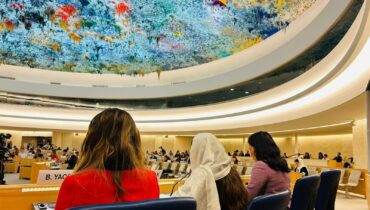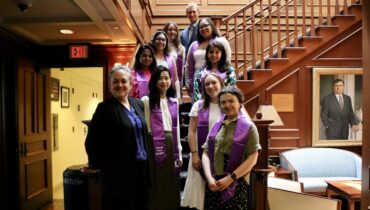President Biden signed a Presidential Memorandum on Promoting Accountability for Conflict-Related Sexual Violence in November 2022, to strengthen the U.S. government’s efforts to address conflict-related sexual violence (CRSV), a crime that continues to be underreported. Despite more than two decades of international efforts to bolster prevention, protection, and accountability for CRSV, conflict actors across the globe from Ethiopia and Myanmar to Russian-occupied Ukraine continue to perpetrate CRSV with impunity. How do we understand this crime? And how can we prepare the next generation of leaders to improve prevention, protection, and accountability?
For the past two years GIWPS has offered a graduate certificate program in Gender, Peace and Security to provide the next generation of leaders with the knowledge and skills to tackle these pressing questions. This spring semester GIWPS, for the first time, is offering a new graduate course “Conflict-Related Sexual Violence” (SEST-697) to examine the different dimensions of conflict-related sexual violence as part of the certificate program. The course explores the narrative of rape as a weapon of war, investigates the theoretical explanations for CRSV, and dives into cross-national and case study evidence. Bringing together experts from the academy, policy, and practice, students will study the legal frameworks, policies, and actions that governments and international organizations pursue to prevent, mitigate, and respond to CRSV.
The course is structured in three parts.
Theory, Data, and Frameworks
In the first section of the course, students will focus on the concepts and theories that provide the foundation for the rest of the semester including: gender, sexuality, race, feminism, masculinities/femininities, intersectionality, colonialism, class, inequality, power, privilege, and more. Together with guest speaker Dr. Roudabeh Kishi, students will critically engage with questions around definitions, data, evidence, and measurements related to wartime sexual and gender-based violence. We will examine common misconceptions and narratives such as “rape as a weapon of war.” To explore international and national legal frameworks, the course will also feature a guest speaker from the Department of State’s Office for Global Women’s Issues.
Causes of Conflict-Related Sexual Violence
We will then turn to the causes of conflict-related sexual violence. Starting with guest speaker Changwook Ju from Yale University the course will examine cross-national patterns followed by current theories and explanations for conflict-related sexual violence. To understand the perpetration of sexual violence that does not neatly fall into categories of wartime and peace, Dr. Phoebe Donnelly from the International Peace Institute will join. Next, Dr. Hilary Matfess from the University of Denver will discuss how, when, and why women become perpetrators. Men’s vulnerability is often overlooked and a taboo topic. To break this cycle, the class will hear from two experts including the Senior Victim Assistance Advisor at the Department of Defense.
Consequences of Conflict-Related Sexual Violence
The final section of the course will explore the intended and unintended consequences of conflict-related sexual violence. Together with a former member of the National Security Council, students will examine the policies governments and international organizations pursue to prevent, mitigate, and respond to conflict-related sexual violence. Students will critically assess interventions–
including the sexual exploitation and abuse by supposed protectors. A final guest speaker from the Department of State will investigate what accountability for conflict-related sexual violence looks like.
After completing the course students will be able to find, examine, and evaluate sources, evidence, data, and reporting relating to CRSV. Students will have an excellent understanding of the causes and factors contributing to CRSV, be able to evaluate current policies and frameworks dealing with CRSV, and articulate an evidence-based argument on how to potentially improve existing policies and frameworks.
About the professor: Dr. Robert Ulrich Nagel is a Research Fellow at GIWPS and directs the Gender, Peace and Security graduate certificate. He earned his PhD in International Conflict Analysis at the University of Kent. His research explored the conflict dynamics that contribute and result from sexual violence, their consequences for international security, conflict resolution, and post-conflict stability. Robert’s research is published in International Studies Quarterly, the Journal of Conflict Resolution, the Journal of Peace Research, Security Studies, the Journal of Intervention and Statebuilding. For his research on conflict-related sexual violence he won the 2019 Cedric Smith Prize and the International Studies Association 2020 Dina Zinnes Award. He is also a member of the editorial team for International Peacekeeping and a leader of the Sexual Violence in Armed Conflict data project.


